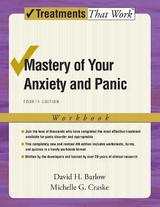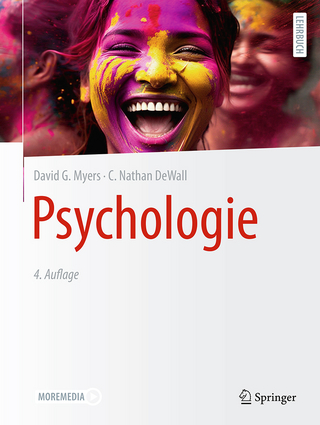
Mastery of Your Anxiety and Panic (MAP-III): Client Workbook for Agoraphobia
Oxford University Press Inc (Verlag)
978-0-19-518696-3 (ISBN)
- Titel erscheint in neuer Auflage
- Artikel merken
Map-III is a systematic cognitive-behavioral program, which uses behavioral self-monitoring to increase awareness of circumstances that trigger panic symptoms. Clients learn specific intervention skills, including how to slow down physiological reactivity through breathing retraining and muscle relaxing training; how to de-catastrophise through actual prediction testing; and how to lessen fearfulness through exposure to feared sensations in safe settings. This workbook is intended to accompany the "MAP-3 Client Workbook for Anxiety and Panic" (ISBN 0-19-518697-4), but is written for individuals who have agoraphobia. This workbook deals mostly with agoraphobic avoidances. Many of the principles and procedures described in this workbook follow directly from the principles and procedures of the client workbook for anxiety and panic. Therefore, the authors suggest that the clients read the client workbook for anxiety and panic before starting with this workbook.
They recommend doing so even if the clients are not currently experiencing panic attacks because, as they describe in much more detail in the chapters, agoraphobia tends to be fueled by a person's concerns about having panic attacks or panic-like symptoms, even when panic attacks have not happened for quite some time.
David H. Barlow received his Ph.D. from the University of Vermont in 1969 and has published over 400 articles and chapters and over 20 books. His major interests over the past 30 years has been the study of anxiety and its disorders, and developing new psychological procedures for practice settings. Prior to his current position as Professor and Director of the Center for Anxiety and Related Disorders and Director of Clinical Psychology Programs at Boston University, he founded clinical psychology internships at Brown University and the University of Mississippi Medical Center. He is the recipient of the 2000 American Psychological Association (APA) Distinguished Scientific Award for the Applications of Psychology. Other awards include the Career Contribution Awards from the Massachusetts and California Psychological Associations, and a MERIT award from the National Institute of Mental Health for long-term contributions to the clinical research effort. During the 1997/1998 academic year, he was Fritz Redlich Fellow at the Center for Advanced Study in Behavioral Sciences in Palo Alto, California. He is Past-President of the Society of Clinical Psychology of the American Psychological Association, and the Association for the Advancement of Behavior Therapy. He was also Chair of the American Psychological Association Task Force of Psychological Intervention Guidelines, a member of the DSM-IV Task Force of the American Psychiatric Association, and was Co-Chair of the Work Group for revising the anxiety disorders categories. Michelle G. Craske received her PhD from the University of British Columbia in 1985 and has published over 100 articles and chapters in the areas of anxiety disorders and fear. She recently completed an advanced level text, Anxiety Disorders: Psychological Approaches to Theory and Treatment. Currently, she is professor of psychology in the department of psychology at the University of California, Los Angeles, and director of the UCLA Anxiety Disorders Behavioral Research Program. She continues to serve on the DSM-IV Anxiety Disorders Workgroup Subcommittee, which is charged with revising the text that accompanies the diagnostic criteria; is a consultant to various national organizations in their efforts to develop and disseminate practice guidelines for panic disorder and other anxiety disorders; and has been awarded NIMH/NIH funds for the study of anxiety disorders. Her research focuses on furthering the understanding of fear and anxiety and in developing more effective treatments for the anxiety disorders.
1. Whats and Whys of Agoraphobia; 2. Preparing To Face Your Fear - Alone and Away From Home; 3. Taking Control of Scary Thoughts - Alone and Away From Home; 4. Taking the Plunge; 5. Troubleshooting and Extending; 6. Involving Others; 7. Medications and the Future
| Erscheint lt. Verlag | 2.12.2004 |
|---|---|
| Reihe/Serie | Treatments That Work |
| Zusatzinfo | numerous halftones, line drawings and tables |
| Verlagsort | New York |
| Sprache | englisch |
| Maße | 215 x 273 mm |
| Gewicht | 238 g |
| Themenwelt | Geisteswissenschaften ► Psychologie ► Klinische Psychologie |
| ISBN-10 | 0-19-518696-6 / 0195186966 |
| ISBN-13 | 978-0-19-518696-3 / 9780195186963 |
| Zustand | Neuware |
| Haben Sie eine Frage zum Produkt? |
aus dem Bereich



